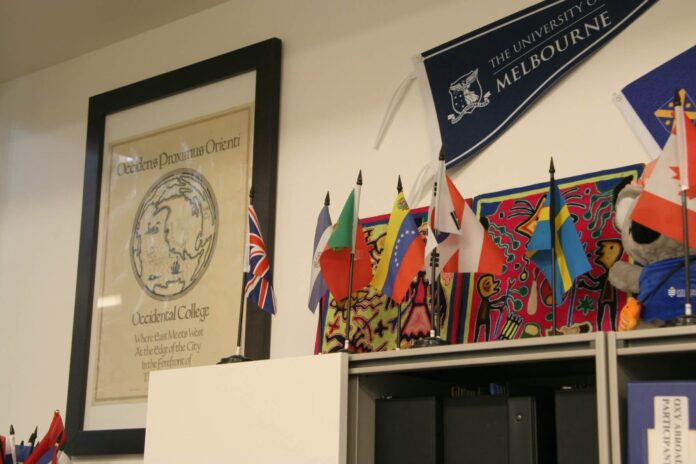
In Fall 2024, more Occidental students will be studying abroad than ever, but there is a caveat. Due to an extreme increase in students applying for study abroad programs, the acceptance process was more competitive than students or the college anticipated, according to Robin Craggs, the executive director of the International Programs Office (IPO).
Wendy Sternberg, the vice president for Academic Affairs and dean of the college, said in a March 29 email that 164 students are studying abroad in the upcoming Fall semester, the largest cohort in Occidental history. Sternberg said that the number of study-abroad applicants was over 60 percent higher than in previous years.
According to the semester abroad website, students who are enrolled full-time at Occidental, will be a junior or senior abroad, have a GPA of 3.0, are not on probation and have all holds cleared before leaving, are eligible to study abroad.
According to Craggs, IPO did the best they could to accept as many students as possible, but the acceptance process was more competitive than it has been in the past. Craggs said that the increase in students hoping to study abroad was more than the estimated number. Therefore, students who meet the baseline requirements to study abroad were rejected for one of the first times, Craggs said.
“Six years of pre-pandemic data would have suggested that about 85-90 students would have applied for study abroad,” Craggs said.
Craggs said that she and her colleagues empathize with students who were not accepted since it is their job to make study abroad happen for students. Moving forward, Craggs said she hopes to work with the college to allow more students to study abroad.
“I commit myself to continuing to work with the institution to find a way to better manage opportunities for students,” Craggs said.

According to an anonymous Occidental student (Student A) who was rejected from study abroad, they are not able to study abroad at a different time, which is what the college has suggested to rejected students. Due to major requirements, sports and financial barriers, Student A said not all students have the opportunity to study abroad at other times.
“[Study abroad was] why I chose Oxy and because I’m double majoring, I can’t even go [abroad] senior year, so this was my only chance. It sucks they did not take that into consideration,” Student A said via email.
Student A said the college also urges students to study abroad over the summer. According to Student A, urging students to study abroad over the summer, which the college does not cover financially, disproportionally impacts lower socioeconomic students.
According to Craggs, there is an appeals process for students who were not accepted.
“Some students have asked for a review of their applications, and we brought that list of people back into the faculty committee,” Craggs said. “There are always some students who aren’t qualified. They don’t do the work that the proposal requires, or they don’t have the grades or they don’t have the correct language for the program that they’re going on.”
Craggs said that this is one of the first years that students who do technically meet the baseline requirements were not accepted because of the sheer amount of people who applied.
“It is true that in the past, when people had weaknesses in one or more parts [of their application], we’ve been able to work with them and the college to help them fix that,” Craggs said. “This year, there’s a line, the college drill line.”
A second anonymous student (Student B) was initially rejected but then received news that they were accepted a week later. Nonetheless, they said that they wish the college was more transparent about how admittance decisions were made, rather than using broad language in rejection emails, especially when they are rejecting people who meet the baseline requirements to go abroad.
Halle Knutson (senior) is an IPO peer advisor who leads information sessions about the study abroad process and works at the front desk to answer student questions and read over their applications. Knutson said she studied abroad in Amsterdam in Fall 2022.
“Obviously a lot of people are upset, which I totally understand. We’ve been getting a lot of emails from students who are advocating for themselves, which is awesome because they really care. And a lot of parents have also been calling and emailing just because they want to advocate for their kid to go abroad too,” Knutson said. “There has been a huge response from people which I think is warranted and makes a lot of sense.”
According to Knutson, she added students who emailed asking for their applications to be reconsidered to the appeals list.
“IPO reviews all the applications, but the college has the budget for study abroad,” Knutson said.
Knutson said that before the initial decisions were released, a form asking if anyone would want to be considered for Spring 2025 was send out.
“They just didn’t get enough interest for Spring,” Knutson said. “I think 11 people were like ‘I can switch’ but that was it.”
A third anonymous student (Student C) said that they faced many barriers to finding explanations for their rejection. Student C said they were initially declined requests to formally meet with a college representative. Over a week later, after reaching out multiple times, Student C received an explanation for their denial.
“When I was initially rejected from Oxy’s study abroad program, I was utterly confused and frustrated by the contrast between Oxy’s branding of study abroad and the ambiguous and impersonal rejection emails that did not specify what element(s) of the application did not deem me — and an unprecedented amount of other students — fit for its study abroad program,” Student C said via email.
According to Student C, although they understand that there are a limited number of spots for students, they are frustrated because the selectivity was not made clear to applicants while they were applying. Further, Student C also said that they are upset with the lack of support and transparency from the school both financially and emotionally.
“It is absolutely unfair for students, though well-qualified, who happen to fall into a pool of large applicants to face the consequences of such systemic disorganization,” Student C said via email. “Moreover, it speaks to the false advertisement of the distinguished support students will receive through their so-called well-funded and organized study abroad program.”
According to Craggs, the acceptance rate for studying abroad is around 80 percent.
“From what I’ve heard, InternLA had to have like a 40 percent acceptance rate and the [Undergraduate Research Center] has a lower acceptance rate,” Craggs said. “So, comparatively, if we were to do the math, including Campaign Semester and the [UN Program], I think it would be almost a 90% acceptance rate.”
Student C said that it is not the fault of individual faculty, but rather of the systemic misallocation of resources for students and misbranding of the study abroad program as well-funded and accommodating.
“Study abroad must not be marketed as inclusive and supportive of an opportunity as it is for incoming and current students, even if the only failures seem to emerge during unprecedented times,” Student C said. “It is unfair for students to endure such emotionally taxing communication and support (or lack thereof) because of an anomaly year.”
Craggs said that she does want students to know that she is sorry about the effects of this data-bursting year.
“I’ve worked here for 23 years because I love Occidental students, and I love the mission of the college and I want this to be the kind of place that students can thrive in,” Craggs said. “I wish we could do all the things that everybody wants to do all the time. There are cuts in life. Realistically, you don’t get every job you apply for. If your cover letter doesn’t make a strong case that you bring the skills to the needs of that organization, you don’t get the job.”
According to Craggs, she is committing herself to continuing to work with the institution to find a way to better manage opportunities for students.
Contact Eliza Bodden at bodden@oxy.edu.
![]()






























